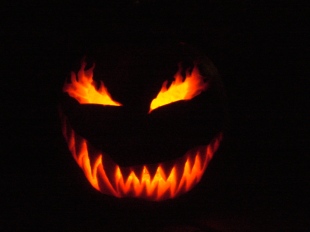
Every year on Halloween many Americans become anxious. Not from the possibility of their houses being “toilet papered” or “egged”, but from sinister evil that lurks on this devilish holiday. It wasn’t long ago that we told kids to be on the lookout for razors in candy.
So much of Halloween’s harrowing tales are ingrained from movies and television, in which malevolent characters on a quest for death and destruction: scary masked men, evil spirits, or a machete yielding murderer runs a muck. Many people enjoy the thrill of a scary movie and see Halloween as benign but others truly believe Halloween to be an evil affair.
Some of the supposed origins of Halloween came from a pre-medieval Celtic pagan festival, Samhain. Those who celebrated this festival on the heels of the summer, believed that the world of the living and the dead were thinly divided on or about October 31. Agricultural duties were carried out to prepare for winter. Some rituals were preformed to placate evil spirits. It is difficult to know what exactly happened during Samhain because we do not have any credible ancient first-hand accounts. Later pagans and Celtic people recaptured the festival in other localized traditions.
The word “Halloween” has nothing to do with Samhain or evil occult practices. Early Christians contextualized European winter celebrations into All Saints Day as a way to remember and honor faithful Christian saints. The day before All Saints was celebrated as “All Hallows Eve” and the phrase morphed into Hallowe’en or just Halloween. Modern celebrations of Christmas, Easter, and Epiphany are all contextualized holidays that honor Christian beliefs. Local pagan practices were replaced with Christian ones, in order to help express Christ in local forms to local peoples. By separating All Hallows Eve from the pre-Christian practices, Christians can take comfort in understanding the historical Christian remembrance that is associated with All Hallows Eve and All Saints Day.





You must be logged in to post a comment.